|
READ 'EM!
|
Interview with Derek Padula, author of The Dao of Dragon Ball

http://thedaoofdragonball.com
About Derek Padula
 |
Derek Padula is a website developer, private Shaolin Gong Fu martial arts instructor, video game designer and owner of Young Forest Games, where he creates "Games with Meaning" for PC and consoles, and is also a journalist for the Epoch Times Newspaper.
He holds a B.A. in East Asian Studies with a minor in Chinese from Western Michigan University.
He is also the author of the soon-to-be-published book, The Dao of Dragon Ball: The true history and connections between Dragon Ball and ancient cultures, divine beliefs and the martial arts of the spiritual warrior have never been unveiled. Until now.. |
Note: We asked Derek to be as detailed as possible in his answers to our questions. Thanks, Derek!
All illustrations retain their copyright and are shown here in low res versions for education, reference and review.
| You fell in love with Dragon Ball around the age of 14. |
I don't remember the exact episode [that I first saw], but it was definitely from the first two seasons of Dragon Ball Z, as these were the only seasons to have been dubbed at the time. The first episode I saw was probably early in the Saiyan Saga when Goku was fighting against Raditz. There was a lot of action.
And the "fake Namek" episodes always come back as a strong memory because they weren't particularly good or important episodes, but they aired them all the time.
|

| What was it about the show that intrigued you at such a young age? |
So many different aspects coming together, really. The action and intensity, the production quality, the martial arts combat, the characters and the story were all exciting. It was funny too!
I watched the show just about every day for at least 5 years from that point on, and spent a lot of time on the internet looking for more information about the series. Sounds kind of crazy when I say that now, but it was a very, very good show. Addictive, even. I always wanted to find out what happened next, and even when I had the episodes memorized I could still enjoy the intensity and find some new detail I hadn't seen before.
|

| As a kid, what were you like before you saw Dragon Ball? |
I was in high school and absolutely hated it. Freshman year was the worst year of my life. Didn't really want to be alive at the time.
Luckily a friend of mine was also a big fan of Dragon Ball, and he had the idea of actually practicing a martial art, like in the show. At first I didn't think it was for me, but he convinced me to go to a free Shaolin Kung Fu class and try it out.
I absolutely loved the experience, and it was a life changing event. From that moment onward I became more involved in Chinese martial arts, culture, philosophy, history and life. I later decided to make East Asian Studies my major at Western Michigan University, and Chinese my minor.
Then in 2003 I studied abroad in Beijing to learn Chinese, and trained with a real Shaolin monk and his disciples, and also a TaiJi Straight Sword master.
Around the same time I also began practicing the meditation practice known as Falun Dafa and began writing The Dao of Dragon Ball. Everything coincided.
During all of that time I was still enjoying watching the show, and my knowledge of eastern cultures showed me so many aspects of the series I would have otherwise missed. I started writing them down and now here I am with a book.
|
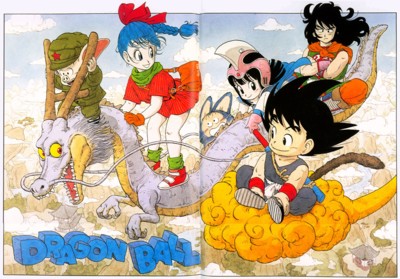
| Did your friend with whom you started training continue on? |
He dropped out after two years. So did all of my other friends who joined in. But the martial arts are something that stays with you forever, so even if you only experienced it for a little bit, it still leaves an impression. The more you put into it, the deeper the impression. |

| Have you met other Dragon Ball enthusiasts who have been inspired to walk a similar path to yours? |
Yes, many! I receive emails and comments on my blog from people who were directly inspired by Dragon Ball to start in martial arts. And I’ve even met people on the street with the same story. I don't drink, but I went to a local bar to get a hamburger and started chatting with the bouncer. Turns out he was inspired by Dragon Ball to take Karate, then MMA, and wanted to get back into his training because it had been a while. There are so many stories out there, and they all started the same way...with Dragon Ball. |

| It's not the show – if that were the case everyone would be so affected – but something within the individual that is able to be inspired by the show |
I make an argument in The Dao of Dragon Ball that there is an element inherent to human beings that makes us want to believe in something greater than ourselves. Or the idea that we can be greater than who we currently are. Some people are more in tune with that than others.
A series like Dragon Ball has inspired millions of people across the world to believe in themselves, push past challenges, and go beyond their current self. It also provides a social community that people can belong to, with its own terminology and world to discuss.
Some people are casual fans while others are more hardcore, but the message of Dragon Ball can be received by anybody, regardless of race, gender, creed, or nationality.
It's the number one selling manga series of all time, and the anime and video games were enormously successful. There are a lot of people who have Dragon Ball in their hearts.
|
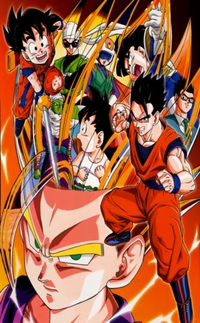
| Other interests besides Dragon Ball? |
I'm a freelance web developer, and I used to be employed at a startup in Los Angeles after being a manager at a small web development firm. That requires a lot of time and effort. But I'd rather be a full time writer.
Hopefully The Dao of Dragon Ball sells well and I can keep doing this.
I moved to LA from Michigan in order to work in the video games industry. I did that for a few years and then got into the web space, but there's still a part of me that loves games. I think I just love to create and play around. I'm still pretty young at heart.
In terms of manga and anime, the only one I really follow is Naruto, and that's because it's the spiritual successor to Dragon Ball. Its very similar, and I'm considering writing a book about that series next. Maybe I'll call it The Rotating Naruto.
|

| You started studying Shaolin Gong Fu at age 16. |
The class size varied, but somewhere between 5 and 30 on a given day. I learned about patience, honor, discipline, hard work, and how to push through pain.
The lesson that sticks with me the most though is something that wasn't even taught to me. There was a poster on the wall that said "A Kung Fu man..." and then it went through a list of 10 things that a Kung Fu man was supposed to do or not do. One of them was, "A Kung Fu man does not lie." When I read that it really struck a chord. I swore a vow at that moment to never tell a lie again.
When I started following that vow it was very difficult. It had been so much easier in life to tell white lies or even outright lies. Really makes things go more smoothly, at least in the short term, definitely not the long. By having to be honest with others, I had to be honest with myself. This forced me to become responsible for my actions and words. Because if I did something wrong, I had to be honest about it, look within, and try to do better next time. That was basically the point where I started to cultivate my inner character. It wasn't just a martial art anymore.
The Kung Fu TV series (starring David Carradine]has a unique history, but overall it's great. It introduced Chinese philosophy and culture to a western mainstream audience. In the book I reference quotes from the series a few times.
|

| You discovered Falun Dafa at age 19. |
Falun Dafa is a meditation and cultivation practice that asks its practitioners to be Honest, Compassionate, and Enduring. It was introduced to China in 1992 by teacher Li Hongzhi and quickly became the most popular meditation practice in modern Chinese history, with estimates of between 30 million and 100 million people practicing, depending on who you ask.
As a result, the Chinese Communist Party outlawed it in 1999, and since then all of the practitioners have been persecuted under a huge campaign of fear, imprisonment, torture, and forced labor. But it's free to practice everywhere else in the world, and is amazingly beneficial.
I've been practicing for 8 years, and honestly, this entire time I've tried to find faults with it, one after another, from many different angles. The bottom line is that I can't. For me its a perfect practice. I really enjoy practicing the exercises, and the teachings help me look within and be a better, more responsible person. When you really do what the teachings say, rather than just analyzing or criticizing them from an outside perspective, they work!
It's easy to judge or think you've got life all figured out, and that other people's faiths or perspectives are weird, but in reality, all of us are making it up as we go along, hoping for the best. We're all suffering together, right?
Falun Dafa gives me a way to ground myself, be tolerant of others, look within and be at peace as I go through life.
|

| You spent a semester in Beijing, China. |
4 months, from September to December in 2003. Yeah, I speak Mandarin.
Life in Beijing was very interesting. My study-abroad partners felt it was dirty, and they became homesick very early. And it was exceptionally dirty, especially with the sand flying in from the desert west of Beijing. The air was so thick with smog that during the day you could look directly at the sun and your eyes wouldn't hurt. The sun was just a smudgy orange disc hanging in the sky, and the air around it was brown. Of course not every day was like that. But regardless, I loved it! China is a great place with 5,000 years of culture and history.
The strangest thing I found about being a Caucasian in Beijing was the way they would just stare at me. They would stare for minutes at a time, unwaveringly. I would look directly at them, smile or wave, and there would be no response. It was like they were transfixed at the sight of a young, white man in China.
What was funny was that the Chinese word for America is "Mei Guo" and for American it's "Mei Guo Ren," which means Beautiful Country Person, in that order. So they naturally believe that all Americans are beautiful. I'm an okay looking guy, but I wouldn't call myself beautiful. However, on the days that I stayed up all night studying (or playing video games) and then spent the next day training in Kung Fu for 8 hours in a row, I didn't look so good afterward. Then when somebody new met me for the first time, they would ask if I was British. I'd say no, I'm American, and they would be really surprised. Kind of funny how the stereotypes worked.
|
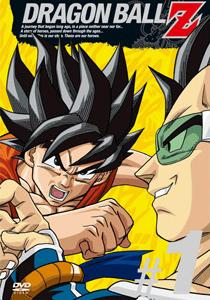
| Explain some of the tenets of the Dragon Ball TV series |
I've seen every episode, including all of the feature films and TV specials, and read every issue.
There aren't really any "tenets" per se. But there are some universal themes and messages. For one, the Young Boy (Shonen) spirit. This is about the will and drive of a youthful spirit to be the best it can be, to push past challenges no matter how difficult they may seem, and to endure through impossible odds.
And for me, the series is also about looking within and discovering how to unlock more of your own potential.
There are countless others, and I wrote an entire book about them!
|
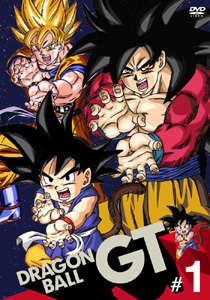
| How long have you been working on your book, The Dao of Dragon Ball? |
I've been working on it for 8 years. It's just such a broad and epic series. There's so much to discuss. And surprisingly, as I wrote the book I kept discovering new things. But just recently I realized that I think I've pretty much researched everything there is to research, and now I'm hunkering down to finish the project as quickly as possible.
The book reveals the complete history of the Dragon Ball series, from its original creation in Japan, to its second wind of success in America, and then abroad. It also uncovers the ancient Chinese and Japanese legends, historical cultures, and martial arts theories that Akira Toriyama used to create the series. I'll show the reader how the martial arts of Dragon Ball are, looking through the lens of eastern culture, entirely possible. In the 80s and early 90s there was an entire science in China dedicated to mind-body research studies, funded by the government.
There's also the social and financial impact, and how the series affected the world of pop culture. Plus a ton more. It's kind of hard to put the book into a specific box or category.
|

| There are several Dragon Ball series |
In short, the story is about Son Goku, a young martial artist with the dream of becoming more powerful. He encounters different characters along his journey, starts a family, becomes a super powerful warrior who can fly and travel through dimensions, including the afterlife, and overall, becomes a savior of the earth.
As a viewer you get to watch Goku's entire life unfold, one issue or episode after another.
[Note: All of the TV series are synopsized at Wikipedia.]
|
| You are the founder of Young Forest Games. |
The goal of the company is to create and sell video games with meaning. I had been working in the video game industry for a couple of years and encountered a moral dilemma. As a practitioner of Falun Dafa I am supposed to be compassionate and tolerant, but I was making a violent video game, The Sopranos, at the time. I realized that I didn't want to do that anymore. My dream had always been to start my own company anyway, so that's what I did.
Young Forest Games came from the translation of Shaolin. Shaolin in Chinese means "Young Forest". I thought about calling the company Shaolin Games, but I didn't want to be disrespectful, nor associate myself with the temple, since I wasn't officially part of it.
Young Forest also has a lot of symbolism to it, such as new growth, potential, and rising upward. It described me at the time I founded it, in 2006.
Right now I have a lot of Christian games, but I'd like to expand it, open it up to a larger variety of meaningful games. Ultimately I want it to be a platform and central hub for video games with meaning where you can rate games according to their inherent values and character, not just graphics and gameplay.
|

| I was struck by one of your chapter headings: "Read about the striking similarities and differences between Goku and Superman, the manifestations and diapoles of cultural idealism and masculinity." |
Sure. Goku and Superman have a lot of similarities. They were both put into space pods as babies, they were both launched into outer space toward the earth as their home planet exploded, they were both adopted and raised as earthlings, and they were both super powerful, even messianic figures. In this sense they also share a lot in common with mythical, legendary or historical figures, such as Moses.
In that chapter I go into great detail about the similarities and differences between the two, show the reader the philosophy of a superhero and what makes Goku so unique.
I do not talk about which one of them would win in a fight! That's not what the book is about.
|

| You write for the Epoch Times |
The Epoch Times is an independent daily newspaper in New York, with offices and weekly papers located around the world. They were founded as a result of the human rights tragedies in China against Falun Dafa practitioners, and then grew through volunteering and grass roots efforts.
There was no free press in China, so they created one. It's now a huge international paper with offices in over 30 countries.
I'm a freelance reporter for the Arts and Entertainment section. I cover films, theater and culture. I've been focused on completing the book recently and haven't had time to contribute, but I'll get back into it soon.
|
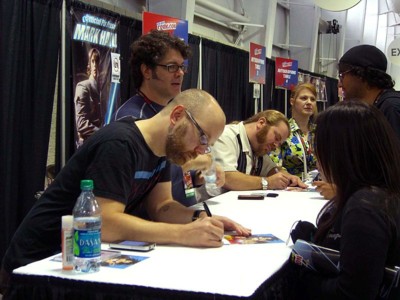
From left to right, seated behind the table: Chris Sabat, Sean Schemmel and Justin Cook,
voice actors on the animated TV series Dragonball Z, at the New York Comic Con, October 15, 2011.
© Luigi Novi / Wikimedia Commons.
| You've contributed to video games such as Pitfall: The Lost Expedition, From Russia with Love, and Puzzles of Life. |
On Pitfall and From Russia with Love I was a video game quality assurance analyst. In other words, a game tester. I played the same game for more than 9 hours a day, over and over again, trying to break it and reporting the problems. The first was at Activision and the second was at Electronic Arts. I also tested Tony Hawk Underground (THUG).
Puzzles of Life is a game I created from scratch. It's a very detailed jigsaw puzzle game that shows you the entirety of life as we know it, from stars and galaxies, to the earth, and down into the microcosm.
I created the entire concept from the ground up, hired some developers, received help from friends and family, original music from Jeffrey Michael at Fireheart Music, and artist interns from Westwood College. It's a pretty good game, and I have big plans for the IP in the future that are currently on the backburner until the book is done.
|

| Anything about Dragon Ball you’d like to talk about that I haven’t asked you? |
If you're a fan of anime, manga, Japanese pop culture, martial arts, world history, philosophy, religion, sociology, or all of the above, then you'll have a great time reading it!
Thank you for the interview!
|
 |
Click on the icons for new features in The Thunder Child.
Radiation Theater: 1950s Sci Fi Movies Discussion Boards
The Sand Rock Sentinel: Ripped From the Headlines of 1950s Sci Fi Films
|
 |
|
WATCH 'EM
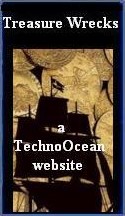

|













